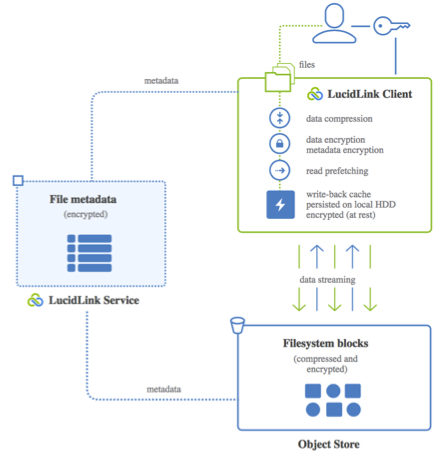Availability of Filespaces From LucidLink
Cloud file service for distributed workloads leveraging S3 compatible back-end
This is a Press Release edited by StorageNewsletter.com on May 8, 2019 at 2:22 pmLucidLink Corp. announced the availability of Filespaces, a high-performance cloud file service for distributed workloads with remote access to large files or terabytes to petabytes of data.
It is a SaaS offering that changes the way organizations handle the challenge of sharing large files over long distances to enable access to huge data sets across globally distributed locations. It works with any cloud, on-prem object storage, and with any OS.
“LucidLink has taken a different approach in delivering cloud file services,” said Steve Anderson, founder, Baseline Ventures. “As cloud services are increasingly adopted, workloads run in a distributed manner and demand instant access to data and files, regardless of size and where they are located. LucidLink solves the problem of immediate file access regardless of size and location by streaming the data you need, when you need it, and where you need it. I believe this is the future of data management.”
LucidLink addresses the problem of distance and latency in cloud environments by reducing the traffic between applications and remote storage. By boosting responsiveness, file data is delivered efficiently and streamed on-demand. Filespaces is a cloud-native file system that sits on top of any object store. It mitigates the effects of latency when using cloud storage as primary storage while allowing users to mount and use it as a local disk. It is for companies looking to extend or replace file servers and NAS with a cloud-native approach in industries like media and entertainment, healthcare and video surveillance.
“The on-premise vs. cloud storage has thus far been two independent and decoupled offerings. By seamlessly transforming any S3 storage into just another tier of local storage, LucidLink allows organizations to leverage the cloud economics for high-capacity data workloads,” said George Dochev, co-founder and CTO, LucidLink. “This, in turn, frees previously siloed data stored on NAS devices, making it accessible from anywhere with the highest degree of confidentiality.”
Seamlessly works with any cloud, on-prem, hybrid storage – and any OS
LucidLink works with any AWS S3 compliant storage provider working with cloud, on-prem, or hybrid storage. It supports all major OSs including Linux, Windows, and macOS.
High-performance file access to object storage
Filespaces provides a file interface to object storage – streaming data securely and eliminating the need to download and synchronize. Both users and applications can connect to the same single namespace and use it natively as if it was a local, shared volume.
Stream data, on-demand
Files are presented as if they are stored locally, streaming only the data that is needed as required. Servers and applications have instant access to large sets of data, even over long distances, without consuming local storage.
End-to-end file encryption
Using their own encryption key, customers have control over their files. Neither LucidLink nor a storage provider can access the data.
“LucidLink has enabled the use of object storage – on premises or in the cloud – with S3 access to work for file access – giving new levels of scale and storage cost economics to their customers,” said Randy Kerns, senior strategist, and analyst, Evaluator Group. “The benefits can be significant for customers in allowing existing and new applications to work transparently with object storage and will remove limitations that previously dictated the storage architecture.”
Key Features
Direct read/write access from the cloud
Desktop and server applications can read or write portions of large files without the need to download or upload them in their entirety from the object store. This results in true random read/write access to large files or data sets, where only the portion of the data currently being used is streamed across the network. This, in turn, provides a performance boost for a large number of applications, like viewing or editing rich media files.
Snapshot support
LucidLink, based on log-structured design, allows the entire filespace to be instantly preserved at any point in time without incurring any performance overhead. These snapshots allow users to restore prior versions of either individual files or revert the entire filespace to an earlier point. In addition, snapshots do not require a complete copy of all the data, but only what’s changed between two snapshots, resulting in an efficient space utilization. This feature is useful for backup purposes and as a defense against ransomware attacks.
Persistent caching and prefetching
The company utilizes the local storage on each device to cache the most frequently accessed data and employs prefetching techniques that improve the overall performance when accessing data remotely.
User access control
Filespaces can be shared across a large number of connected devices or users. To facilitate this, the firm gives administrators complete control over which parts of the filespace users can access. This fine-grained access is achieved while maintaining an encryption model, ensuring users cannot decrypt information they are not allowed to see.
Global file locking
Remote teams working on shared projects, such as architects collaborating on a shared Autodesk Revit model, work seamlessly, as if collocated, without sacrificing performance. LucidLink achieves this by implementing global file locking, giving applications native support for serializing access across multiple users.
“As more companies adopt a cloud approach and embrace an increasingly distributed workforce, we realized that the problem of file access over distance is far from solved,” said Peter Thompson, co-founder, and CEO, LucidLink. “Old protocols built for LAN environments simply do not work well in a high latency world. LucidLink is a filesystem built specifically for the internet.”
Comments
LucidLink finally unveils its product and it is an interesting announcement from Peter Thompson and George Dochev, we met last year, with a singular approach leveraging compatible back-end S3 storage.
With several key features and properties, Filespaces is a cloud file service built on top of object storage and dedicated to client machines.
LucidLink Filespaces Architecture
It is designed to be directly consumed by machines and not considered like a gateway exposing file systems as network shares or directories via NAS protocols.
LucidLink's product joins an already existing group of products with JuiceFS, ObjectiveFS or even Datomia to name a few.
Filespaces supports on-premise or cloud object object with compatible S3 API so it could be AWS S3, of course, Google Cloud Storage with the S3 interoperability mode but also Cloudian or Wasabi. For Azure, using Minio to expose S3 on top on Azure Blog Storage seems to be a good idea and finally you have a wide cloud coverage approach.
The company has one of the most sophisticated product in that space, but even with compelling story and other market offerings justifying real users demands, it seems to be difficult to convert product into a sustainable business. Among the players listed above in this category, only LucidLink has raised money with $7.6 million.















 Subscribe to our free daily newsletter
Subscribe to our free daily newsletter


